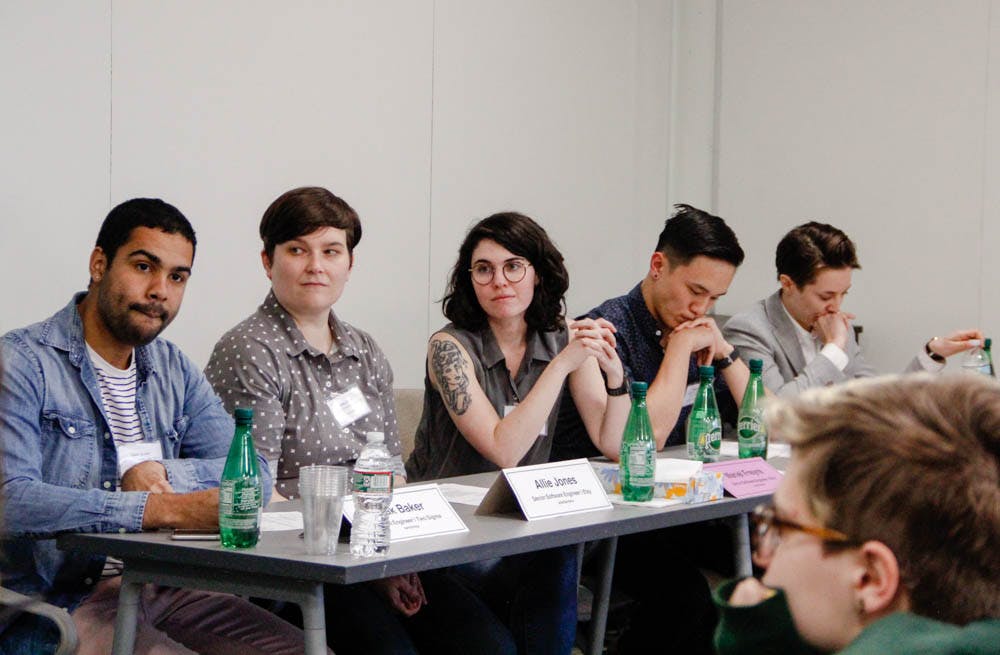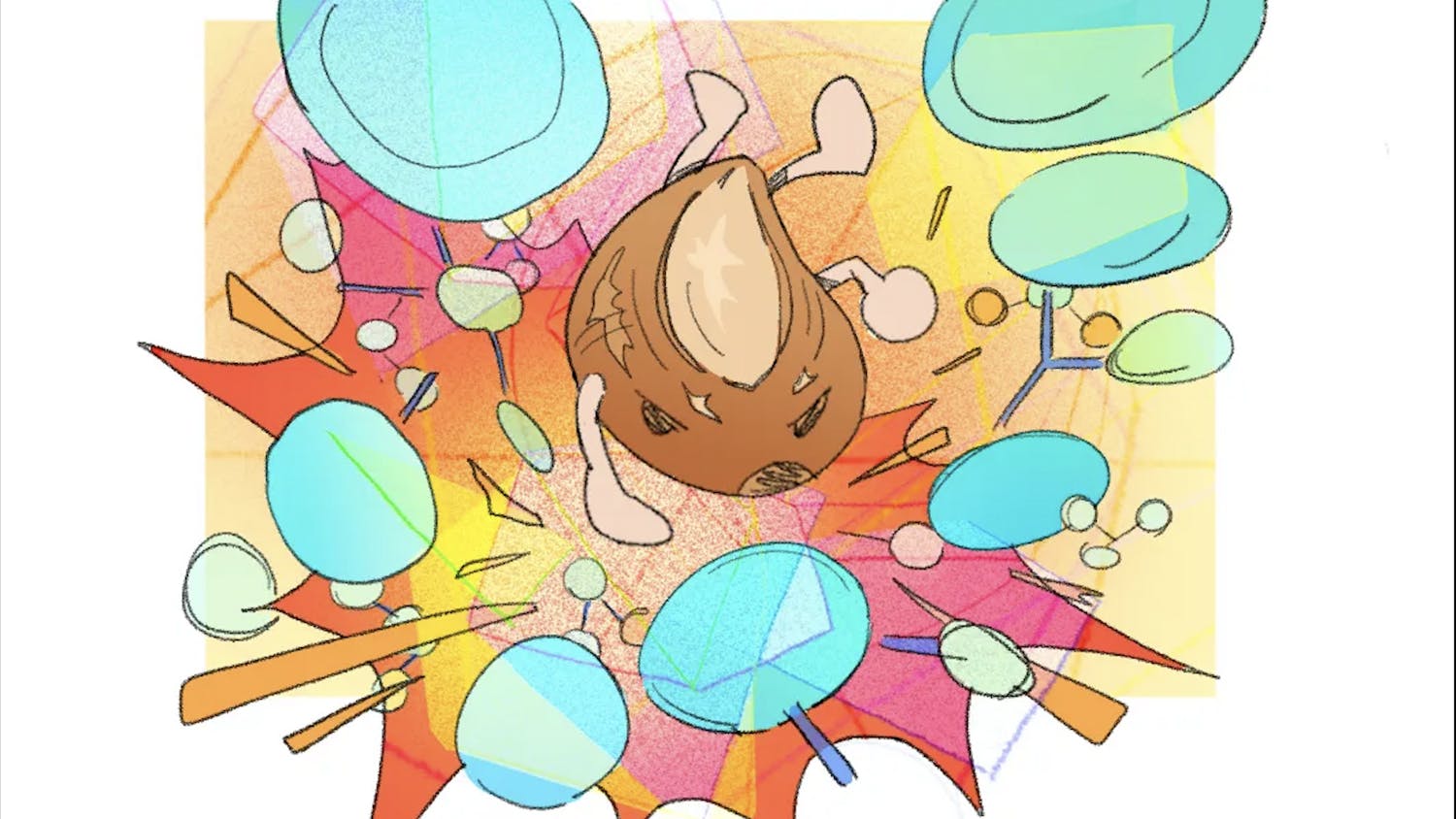When Simon Zheng, a software engineer at Peloton Interactive, first started working, he felt uncomfortable telling his coworkers that he was gay.
“I was unproven (since) I had just graduated. I was very private about who I was dating. But after a year of working there and … feeling like I could do whatever I wanted, I came out.”
Zheng and other panelists from large and small companies in New York and Boston reflected on their experiences of being LGBTQ+ in the tech world during the Friday event “Out in CS.” The panel included Izaak Baker ’15, a software engineer at Two Sigma, Mariel Freyre and Allie Jones, senior software engineers at Etsy and Jingo Mante, a product manager at HubSpot. To organize the event, Diversity Advocates on the Department of Computer Science’s Diversity Committee partnered with Laura Dobler, the department’s Financial and Outreach Coordinator, and oSTEM, a student group that advocates for the success of LGBTQ+ students in STEM fields. The groups worked together for several months to plan the panel.
Panelists spoke on topics ranging from their beginnings in tech to managing their personal identities at work. They also shared strategies for handling workplace microaggressions, maintaining work-life balance and staying connected to their community.
Although all of the panelists are out in their respective workplaces, the process of coming out was not always easy.
“This is interesting because a lot of the narrative around coming out makes it sound like it’s like one event or one occasion in your life … like you weren’t out and and (now) you are, versus something that you consistently have to do over and over. It’s different for different identities. And … there’s never really a good place in a workplace conversation where you can say, let’s pause this (and come out),” said Baker, who identifies as bisexual.
For some of the panelists, coming out has been a process of slowly testing the waters while progressively becoming more courageous about what to disclose about oneself.
“My comfort with my identity, I think that took a while. It started out with, like, a little rainbow flag. And then it started being about (talking about) my girlfriend,” said Mante, who worked in traditional management consulting roles before switching to tech due to the industry’s more socially inclusive work environment.
Others found it difficult to keep their identity under wraps. “I just can’t keep it to myself. … It honestly pops out of me. But, I’ve been at my company for two years and I’m very comfortable with my team and there’s stability in that way,” Freyre said.
Sometimes, having a different identity lends a valuable perspective, which can be advantageous to building better products at work. For instance, Etsy compiles “things like gift guides and there are ‘gift guides for him’ and ‘gift guides for her’ and I think as someone with a more complex gender identity than that, I like being able to be the advocate for other people who might not feel like they’re included in those lists, or make sure there are futures in our products that are more thoughtful for a broader range of people than just the majority of people who use our product,” Jones said.
In any case, there was general consensus on the panel when the discussion turned to the importance of being open with one’s identity at work. “It made me so much more creative … As soon as (there is) confidence in who you are, it really does show in your work and relationships,” Mante said.
To find an inclusive workplace while interviewing at companies, Zheng offered the helpful adage: “Money speaks more truthfully than words.” He recommended figuring out whether the company provides a budget for creating LGBTQ+ groups, organizing events like Pride or offering health insurance benefits for domestic partners.
When combatting microaggressions in the workplace, Freyre emphasized the importance of speaking up, even with the temporary discomfort one might endure in the process. “A lot of the time, I am that angry bitch,” Freyre said, while laughing. “But … either way, you’re going to suffer. You’re going to suffer if you say it (but) you’re (also) going to suffer if you stay silent.”
Meanwhile, Baker stressed the importance of picking one’s battles. “I have to drag you through 15 realizations to get you to understand why what that thing you said is not okay, how it could be better and why you should care. … It’s very exhausting to do that.”
Patrick Freeman GS, one of the co-founders of oSTEM, said, “I feel like, so often, the professional world seems so far away … so stifled in many ways and we always have to be performing. And I feel like (this event) kind of dropped the barrier for a little bit. It was really exciting to see (the) undergraduates so excited about the questions and laughing and agreeing with what was said. … There was a lot of good energy.”
Ben Wilks ’15 GS, the other co-founder of oSTEM, said, “I appreciate the fact that they talked about having multiple identities … how they each played a very important role in the work that they do and in their personal life. I really appreciated that they were like, ‘we’re still kind of on this trip of figuring out how to take care of yourself and how to adjust to adult life.’ … It was really valuable to hear that.”
Evan Dong, ’22, who is considering working in tech after graduation, said, “It was nice to hear that, for the most part, people could find … workplaces (and) communities where they did feel supported and (that were) not oppressive for them to have their identities.”
Correction: A previous version of this article stated that Izaak Baker ’15, a software engineer at Two Sigma, identifies as gay. In fact, Baker identifies as bisexual. The Herald regrets the error.





